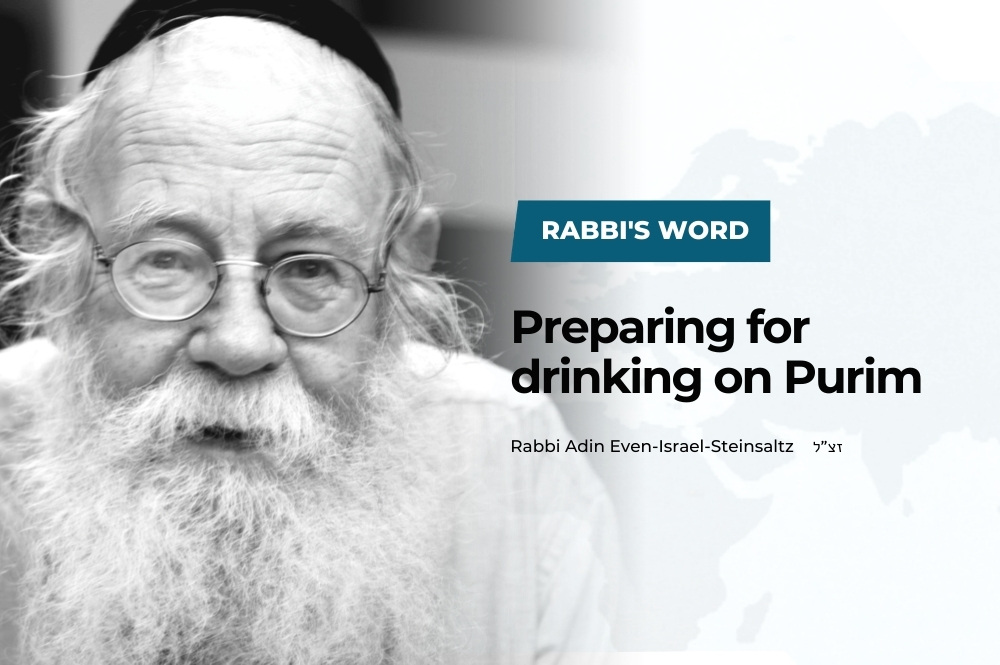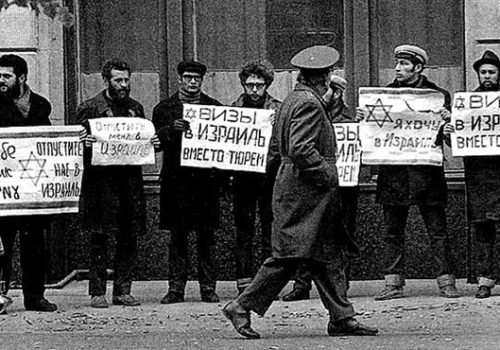
We continue cooperation with the institute of Rabbi Adin Even-Israel Steinsaltz and publish specially prepared material for the communities of the EAJC members. We publish this article after the death of Rabbi Steinsaltz, one of the greatest philosophers of our generation, a scientist and a Hasid. Let his memory be blessed.
The connection between Purim and Yom Kippur is well known. Our Sages have already stated that Yom Ha-Kippurim is ke-Purim, “like Purim.” Their common denominator is that neither of them is a regular, normal continuation of ordinary life. On both these holidays we break out and behave as though we are not ourselves: On Yom Kippur we do major teshuva, and on Purim we diverge from our ordinary state of mind, we drink and become intoxicated “until one does not know.”
However, there is a basic difference between these two departures from the norm. Yom Kippur is intrinsically a day of forgiveness and pardon, and “the essence of the day effects atonement” even without man’s inner work and preparation. By contrast, the departure from constraint on Purim requires extensive preparation beforehand. The loss of lucidity must be gone about with awareness and knowledge of what one wants to accomplish by this divergence, for otherwise no profit will remain from Purim. All that will be of Purim is a day that began and ended, with nothing left of it but a headache and soiled clothing. (And what a pity to go through all the trouble! For one could suffice with the halakhic “until one does not know” – namely, sleep.)
Part of the theme of Purim, although there is no source for it in Scripture, is masks. In Megillat Esther, the Megillah of concealment, there are quite a few disguises. Our Sages relate that Haman actually was the bathhouse attendant and barber of Kfar Kartzum, who disguised himself as “the great Haman.” Esther, too, disguised herself, in that she did not reveal her people or her kindred.
And most importantly, the miracle of Purim itself is in disguise. In the world, there are open miracles of deliverance, and in the case of Purim the miracle is the same miracle, only that it is hidden behind a mask, so that everything appears ordinary, as though the deliverance was by natural means.
The world itself has a disguise – nature (ha-teva), whose numerical equivalent (in Hebrew letters), the Divine Name Elokim, reveals what lies hidden behind nature. In the literature it is written that teva (nature) is so called because the true content sinks (tove’a) in it and is lost, while from the outside one sees only the external things and not what lies inside.
That is why one must become intoxicated: in order to see the miracle of Purim, to see the things that lie behind the masks. The miracle was not completed by the fact that many of the people of the land professed to be Jews; for that, too, was in truth only a mask. Part of the theme of Purim is that the masks are removed from the Jews themselves. A decree of Ahasuerus was necessary, so that the Jews would take off their masks and decide that they are Jews; so that everyone should try to tear off the masks (masekhot) which conceal (mekhasot).
Physiologically, alcohol acts as a depressant, lowering the vital activities. (An extreme case of this effect can be observed in one who drank a large amount of alcohol and fell asleep. It is difficult – if not impossible – to rouse him from his sleep.)
The depressant effect is gradual. In the first stage, alcohol lowers the functioning of the “control centers” in the brain, which inhibit a person from doing certain things, whether positive or negative. This creates an opportunity for those things – which generally are dormant, latent – to come to expression. In and of itself, the alcoholic drink has no message; its whole task is to enable other things to emerge.
Intoxication gives rise to all sorts of things. Some people become happy, others begin to cry. One person lets out all the foulness of the world, while from the next person spring forth only holy things.
In order for the intoxication to be beneficial and not just make one uglier and despicable, it is important to decide beforehand where one wishes to end up through the intoxication and in what manner one wishes to depart from constraint. One must have in mind beforehand where this outburst should lead, and plan the manner in which to release the chains and depart from habitual patterns of behavior.
Just as, according to the Halakhah, there are cases where it is sufficient to begin an act with a certain intention in order for the entire act to be considered as having been done with that intention, the same applies to intoxication: it all depends on one’s intention before beginning to drink.
If one’s intention is to drink for the sake of the drinking, for the sake of boisterousness, or in order to fall asleep as quickly as possible – these will be the goals that ultimately will be attained.
If, however, the intention is to enter a state of intoxication so that something profound should emerge – even if one does not know beforehand exactly what that something is (Purim, after all, is the day of mystery and not knowing) – then this is a unique opportunity to function not in the way of ordinary intellect but on the heights above the intellect.
A person should say: Now I am transcending the bounds of knowledge and logic; now I have the opportunity to transcend my ordinary limits. I can use the opportunity of Purim to open things that I cannot touch all year round.
Many times in the course of our lives, we are afraid to take initiative. Sometimes we must make decisions, but we haven’t the time or the courage to make them. Since life never stops on its own, everything continues, and there is no point at which this cycle can be halted.
We form fixed notions of ourselves, and everyone decides about himself: “I am thus and thus, everyone knows me as such, and that is also the way I must be.”
On Purim we have the opportunity to come out of our fixedness, since everything is moving and shaking.
This applies not only to the matter of fulfilling mitzvot and serving God, but to all areas of life. We need the assistance of something that will move us, and although the courage gained from drink is not genuine, after a decent gulp one gains sufficient courage to resolve to change one’s life from now onward.
Sometimes a person is anxious about the consequences of the inner changes that he would like to adopt. Who among us has not asked himself, “If I begin to attain all sorts of heights and levels, who knows where I might end up?” So, too, when we pray or engage in serving the Creator, we become apprehensive. “I might, God forbid, turn into a respectable person!”
Purim is an opportunity to undergo inner metamorphosis, to make resolves that we previously avoided because of all sorts of fears generated by the mind. The lack of lucidity on Purim perhaps affords the possibility for committing all the transgressions I ever wanted to commit, but on the other hand it also presents the opportunity of doing all the mitzvot that I ever wanted to do but did not dare.
Purim is the time to make a leap to a different side, and to remain there on the day after. The departure from constraint is not just for the duration of the intoxication; rather, it is an opportunity to extricate oneself, since in any case one is not on the usual course of life. Purim is the impetus to changes; after Purim, we hope to find ourselves in a different place.
During the course of the year, there are many things that we would like to do or say, but we do not do or say them –sometimes because they are impolite or not nice, sometimes because we are not sure that this is what we truly think.
When Purim arrives, suddenly statements of a different kind altogether emerge from us and from others, statements of real value. In the course of the year, I might want to say to someone, “Every time I see you, there is light in my heart,” but I cannot say these words to him, since we know each other too well, and it is already difficult to verbally express the fact that we are dear friends. On Purim there is an opportunity to say all sorts of things. It could be that by tomorrow we both will have forgotten this tipsy conversation, but some memory or trace of it always remains.
Where do these statements come from? Just as on Yom Ha-Kippurim one can say, “Now time has no meaning, the clock can be turned back, and I can act as though I never sinned,” so, too, on Purim I can say anything and do anything, as though it were a new world.
Purim is a holiday on which we remove our masks, and it is impossible to know beforehand exactly what lies behind them. What will be revealed depends primarily on the question: How do we enter the holiday?
Purim is a day of exceptional rejoicing, a day of revelry, the only day on which a Jew is permitted not to be composed of mind. It is a day on which we are commanded to lose awareness in order to open new doors. What lies beyond the door? That depends on how we prepare ourselves before opening it. (blessed memory of him).
To all dear readers, happy Purim from the Rabbi Steinsaltz Center (blessed memory of him). Lehaim, lehaim!

